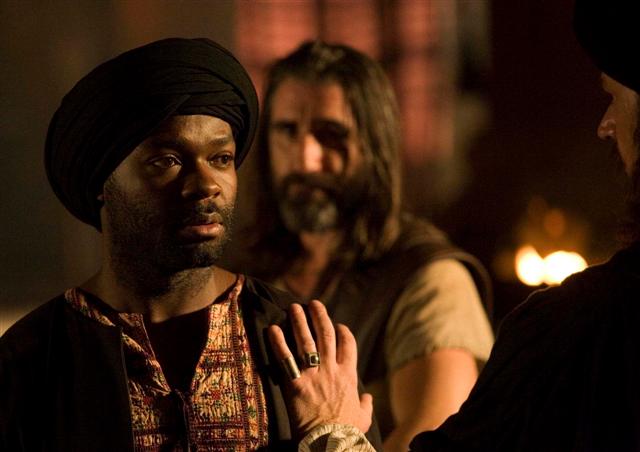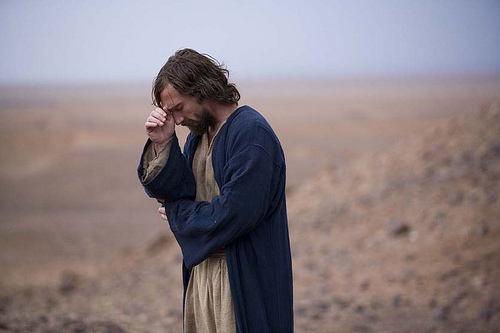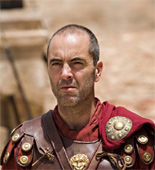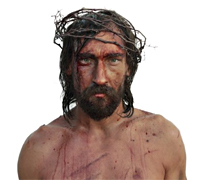
| Home |
| News |
| Blog |
| Films |
| Poetry |
| Drama |
| Music |
| Articles |
| Books |
| Video Clips |
| Links |
| Newsletter |
| Contact |
Reviews of The Passion (BBC) - From Blog Entries
27/3/08
Last word on The Passion for the moment - must get on to other
topics! Overall my opinion of this drama hasn't changed much. The portrayal
of Mary I'm still not happy with, while I really got to like the portrayal
of Jesus. My media column in today's Irish Catholic newspaper was
devoted entirely to the programme and my review was generally positive.
On the back page columnist David Quinn wrote a negative piece about it
- he found this depiction of Jesus "the most unconvincing ever to come
our way". Jesus as played by Joseph Mawle he found "insipid, uncertain,
uncharismatic, unprepossessing". He wondered how such a man could ever
attract any followers. He didn't like the way the apostles were quarrelsome,
not just among themselves but with Jesus. In trying to avoid the error
of making Jesus too holy and divine he reckoned they fell into the opposite
error and portrayed Jesus as "effectively a man and no more". Thus miraculous
events were portrayed in an ambiguous way.
Funny enough I shared many of these observations, though not as strongly,
after watching the first episode. However this production grew on me as
the episodes progressed and I found the resurrection scenes in particular
very strong on the miraculous, though I realise not all critics I've read
agree on that.
I followed a few of these reviewers as they too engaged with this drama
through Holy Week. Matt Page's Bible
Films Blog was especially comprehensive in it's coverage, while Doug
Chaplin posted detailed and interesting reviews after each episode on
his Metacatholic
Blog. Giving a Catholic perspective various contributors reviewed it on
the Jesuit Thinking
Faith website.
24/3/08
Thinking today about how I might use clips from BBC's The Passion
in my religion class. Had been doing religious themes in TV drama with
my Transition Year students so this would be a suitable follow on, and
normally after Easter I do some classes on the Resurrection with third
year students. Up to now I've used the Resurrection scenes from Jesus
of Nazareth, which haven't at all become dated and are still powerful
and moving. Maybe for variety I'll use the last 20 minutes of The Passion
this year, with plenty of discussion as the students may find the use
of different actors for Jesus rather confusing. I'll be interested in
hearing their reaction. When I come to do the Eucharist with Leaving Cert
students prior to Graduation Mass I'll use the Last Supper scene, another
of my favourite "set pieces" from this new production.
23/3/08
The Passion on BBC: Have just finished watching the final
half hour episode of The Passion, so these are some preliminary
thoughts. At the start I was a little disappointed - I began to wonder
if the film was going to be coy about the resurrection. There were two
Temple Guards instead of Roman soldiers, half guarding the tomb, no sign
of any angels, lack of clarity about how much time had passed before the
empty tomb was found by Mary Magdalen, talk of some of the apostles planning
"something".
Then there was a gradual yet dramatic transformation - Mary met a man
at the tomb, who didn't look like Jesus but she felt it could have been
him. What was this - getting a new actor to play Jesus, after getting
so used to Joseph Mawle? The producers keeping their options open on whether
it was Jesus or not?
Then after lots of realistic bickering two apostles headed off on the
road to Emmaus and met another mysterious stranger, more charismatic,
which helped. What's this, I thought, now we have three actors playing
Jesus? I thought this was a really bold way to convey the Emmaus story
when Jesus was not recognised initially. The apostles invited him for
a meal, and in a most powerful and emotional moment they really did recognise
him in the breaking of bread - the way Jesus did it was just the way he
had done it in the Last Supper scene. At that moment Mawle appeared again
as Jesus, Jesus that had conquered death and really risen. Shortly after
that he appeared to the doubting apostles and that too was a moving scene.
There wasn't exactly an Ascension scene. Jesus just departed into the
crowds after a chat with Peter, reassuring him that he would be with them
always. All in all this was a most striking presentation of events after
the crucifixion.
 If
there was anything unsatisfactory apart from what I mentioned at the start
it was that many post resurrection events were not portrayed - e.g. the
doubting Thomas incident (James seemed to be a bigger doubter initially).
Yet a lot of attention was given to the conflict between Caiphas and Joseph
of Aramathea (left), and relatively speaking I'm not sure this plot line
was worth pursuing in such detail. Caiphas was not portrayed as sympathetically
in the previous episode when he handed over Jesus, but in this episode
he was softened again. He felt he had done what was best for his people,
and that as he saw it, he had not agreed to the death of an innocent man
- he still regarded Jesus as a blasphemer (or so he said). He got a happy
ending of sorts as his wife delivered a new baby.
If
there was anything unsatisfactory apart from what I mentioned at the start
it was that many post resurrection events were not portrayed - e.g. the
doubting Thomas incident (James seemed to be a bigger doubter initially).
Yet a lot of attention was given to the conflict between Caiphas and Joseph
of Aramathea (left), and relatively speaking I'm not sure this plot line
was worth pursuing in such detail. Caiphas was not portrayed as sympathetically
in the previous episode when he handed over Jesus, but in this episode
he was softened again. He felt he had done what was best for his people,
and that as he saw it, he had not agreed to the death of an innocent man
- he still regarded Jesus as a blasphemer (or so he said). He got a happy
ending of sorts as his wife delivered a new baby.
Pilate was played fairly straight throughout, not rehabilitated, not a
psycho, rough by our standards, perhaps half civilised in the context
of the time. Even he had a return to Rome to look forward to.
Once again I wasn't that keen on the portrayal of Mary, still too bitter,
complaining that God had broken her heart. In general I felt she was underused,
as was Mary Magdalen throughout. I'll return to this topic for some more
considered observations on the whole series, with some ideas for using
parts of it in class when I get back to teaching religion after the Easter
holidays.
22/3/08
Have just watched the third episode of BBC's The Passion. Preliminary
thoughts: Once again I find the programme growing on me more and more,
especially the central performance.
I particularly liked the way the Last Supper was done - starting cheerfully
and ending on a sombre note. There was no hedging on the Eucharist. After
the usual words Jesus added - "this will be your sacrament … this is how
you'll bring me back among you", a rather interesting addition I thought.
The presentation of the agony in the garden was reminiscent in visual
style of the way it was done in Gibson's The Passion of the Christ,
but Jesus got to express his agony in much more detail. Unlike the latter
film however the scourging at the pillar was played down (perhaps in reaction
to that film?) - we just got three representative lashes, with the camera
focussed on the face of Jesus.
The way of the cross was quite short, with Jesus being crowned with thorns
on the way, and a repeat of the children throwing red petals as they did
in the Palm Sunday scene. This hurry seemed to be designed to convey how
quickly the Jewish leaders wanted Jesus put to death, hoping it would
defeat his cause and scatter his followers. There was no crowd on Golgotha,
suggesting this might just have seemed an "ordinary" crucifixion to the
locals at the time. Mary and John arrived a bit later, but in time for
Jesus' death.
Jospeph Mawle's central performance was really genuine, affecting and
convincing in the crucifixion scene. One curious thing - it was particularly
obvious in this episode how the use of the word Jewish was being avoided
- e.g. Jesus was described several times as "King of the Judeans". Was
this to avoid any accusations of anti-Semitism? Maybe so, but it didn't
really sound right. Maybe Jewish people will be even more offended by
this ignoring or making bland of their name, race and religion. Would
the title King of the Jews not also include Gallilleans, not just Judeans?
One more episode to go Easter Sunday night. Interesting to see how the
resurrection will be done.
20/3/08
I have lots to write about recent activities in school especially in relation
to religious themes in TV drama, but I'm going to try and keep all my
commentary on BBC's The Passion in one place here, and will get
to other TV drama next week.
Already this year in class I've dealt with films on the life of Jesus,
but after Easter I may use clips from the BBC production to update this
module, but also to show yet another example of religion in TV drama.
So far I really like the Palm Sunday scene and Jesus' conflict with the
apostles over what's going to happen to him.
I have to be careful this week to concentrate more on the Holy Week story
itself rather than this particular representation of it! However, because
of the serialisation of it, as it runs through Holy Week it is in my thoughts
quite a bit and new ideas occur to me daily.
 As
regards the human/divine issue, this production seems more to veer towards
the human side of Jesus, especially in the first episode. The second episode
balanced it a bit in what Jesus was saying about his mission and his resurrection.
I'm looking forward to how they will represent the resurrection, and also
to how they'll do the Last Supper. I doubt if we'll get a Leonardo type
tableau, like director George Stevens went for in The Greatest Story
Ever Told. Focussing entirely on the holy week events seems to me
a good approach to a Jesus film, as it gives a tighter focus and avoids
the excesses of sprawling Biblical epics. Mel Gibson used the same approach
in The Passion of the Christ, using an even tighter time frame
- from the striking Garden of Gethsemane scene to the Resurrection.
As
regards the human/divine issue, this production seems more to veer towards
the human side of Jesus, especially in the first episode. The second episode
balanced it a bit in what Jesus was saying about his mission and his resurrection.
I'm looking forward to how they will represent the resurrection, and also
to how they'll do the Last Supper. I doubt if we'll get a Leonardo type
tableau, like director George Stevens went for in The Greatest Story
Ever Told. Focussing entirely on the holy week events seems to me
a good approach to a Jesus film, as it gives a tighter focus and avoids
the excesses of sprawling Biblical epics. Mel Gibson used the same approach
in The Passion of the Christ, using an even tighter time frame
- from the striking Garden of Gethsemane scene to the Resurrection.
The only down side is that some of the great stories and incidents from
the earlier parts of Jesus' life are missed, so we don't get the context
of the Easter story. Gibson's film was much criticised for this, but he
did try to overcome the problem by some of the intriguing flashbacks.
If only we had more of those and less of the graphic violence!
The BBC production is particularly good at context, in the gritty atmosphere
of Passover and in the conversations of the main players. There is plenty
of Jesus' teaching, not always exact quotes from scripture. The fresh
wording does grab the attention, as we can get too familiar with the well
known sayings, but there's always a danger with people taking liberties
with scripture. Yet, when only the words of scripture are used, as say
in the Matthew series, when Bruce Marchiano played the warmest
Jesus I've seen yet, it comes across as stiff and stilted in film terms.
18/3/08
 Last
night I got to see the second episode of the BBC's The Passion,
this time a half hour episode. I’m getting to like Joseph Mawle’s portrayal
of Jesus, perhaps just a matter of getting use to him in the role. I liked
the scene where he discussed what was going to happen to him with the
apostles. John, often portrayed as a gentle soul, had a particularly negative
reaction to this and became quite shirty with Jesus!
Last
night I got to see the second episode of the BBC's The Passion,
this time a half hour episode. I’m getting to like Joseph Mawle’s portrayal
of Jesus, perhaps just a matter of getting use to him in the role. I liked
the scene where he discussed what was going to happen to him with the
apostles. John, often portrayed as a gentle soul, had a particularly negative
reaction to this and became quite shirty with Jesus!
It’s still hard to distinguish the apostles from each other – more work
could have gone into giving at least some of them more distinctive personalities.
Jesus was quite strong on the idea his sacrifice saving us from our sins,
and in a neat ironic touch, Caiphas also spoke of one man being offered
up to save the rest.
The softening of Caiphas continues, but he is edging his way towards having
Jesus arrested and handed over to the Pilate (James Nesbit,above)
for execution if he doesn’t repent and stop causing unrest during Passover.
Other Jewish leaders, including a black Joseph of Aramathea, are not in
favour of such a move. With this balance so far, I don’t think there’ll
be any accusations of anti-Semitism against the programme.
A few more thoughts occurred to me about Sunday’s opening episode. I was
just thinking how lacking in colour the whole production is – it’s all
dull browns by day and dark blue by night, but the portrayal of Palm Sunday
was striking – apart from the palms, the people were showering Jesus with
red petals, perhaps a foreshadowing of the blood to come.
I’m still not enamoured by that scene with Mary the mother of Jesus. Obviously
she loves him and seems grouchy on his behalf, but it’s as if she resents
having been chosen for her role, as if it was foisted on her without her
permission – she has a line that says something to the effect that the
baby was in her belly before she knew it. But this doesn’t necessarily
clash with the biblical version – maybe this is something that Mary says
in the heat of the moment, under the pressure of seeing her son heading
inexorably towards a horrible death.
Last time I noted that the production seemed to shying away from miracles.
This time there was at least a mention, by Caiphas, of miracles that Jesus
was reputed to have performed, though Caiphas himself was sceptical. And
in this latest episode Jesus is very clear that he will rise again, leaving
the apostles looking sceptical!
It’s useful to have the programme serialised through Holy Week, though
I would have preferred to see six half hour episodes spread through the
week rather than two one-hour and two half-hour episodes. For those who
would like to see it again or catch up there’s a recap edition next Sunday
afternoon at 2.15 pm before the final episode on Sunday evening at 7.30
pm (BBC 1).
17/3/08
Full marks this year to BBC for taking the Holy Week and the Easter story
so seriously. With HBO they have produced a high budget dramatisation
of the last week of Christ's life on earth leading up to the Resurrection.
The Passion started last night on BBC 1, continues tonight and
Good Friday and will finish Easter Sunday night. Based on last night's
opener the signs are pretty good.
 As with
all film versions of the life of Christ the key issue is how Jesus himself
is played. Joseph Mawle (left) is a more bedraggled than usual Jesus,
but he has an appealing smile, a gentle and compassionate manner. At this
stage he seems quietly confident of the mission he has from his heavenly
Father. We see him preaching, tending to the sick, and forgiving sins,
but so far there seems a reluctance to show physical miracles - even where
the scriptural context seems to call for it - there was one scene reminiscent
of the sick man by the pool of Bethsaida and the healing of another crippled
man. He says to this man that his sins are forgiven, but there's no talk
of taking up the bed and walking. This naturalistic approach was evident
from the beginning when it was hard to pick Jesus out from the crowd of
apostles - no telling music or reverential camera angles, unlike Jesus
of Nazareth when there wasn't any doubt that the magnetic and intense
Robert Powell was Jesus. For me Powell's is still the definitive portrayal.
As with
all film versions of the life of Christ the key issue is how Jesus himself
is played. Joseph Mawle (left) is a more bedraggled than usual Jesus,
but he has an appealing smile, a gentle and compassionate manner. At this
stage he seems quietly confident of the mission he has from his heavenly
Father. We see him preaching, tending to the sick, and forgiving sins,
but so far there seems a reluctance to show physical miracles - even where
the scriptural context seems to call for it - there was one scene reminiscent
of the sick man by the pool of Bethsaida and the healing of another crippled
man. He says to this man that his sins are forgiven, but there's no talk
of taking up the bed and walking. This naturalistic approach was evident
from the beginning when it was hard to pick Jesus out from the crowd of
apostles - no telling music or reverential camera angles, unlike Jesus
of Nazareth when there wasn't any doubt that the magnetic and intense
Robert Powell was Jesus. For me Powell's is still the definitive portrayal.
Jesus' mother makes a brief appearance, but she's rather grouchy about
the trouble Jesus is getting himself into ("I didn't ask for this" she
complains, not quite the Mary of the Magnificat), but they part on good
terms at least.
The highly charged atmosphere of Jerusalem at Passover is captured well,
with its intermingling of political and religious culture. Jesus causes
a stir by his arrival. Pilate is in town worried about unrest, and anxious
to show that Rome is boss. The Romans are rough and cruel as always but
the Jewish temple guards are portrayed more sympathetically than in Mel
Gibson's Passion of the Christ, while the Jewish high priests are
also given a softer than usual treatment. So far Caiphas is a fairly sympathetic
character, a family man trying to keep the peace and adopting a grin-and-bear-it
approach to the Roman occupation. Judas is a spy for the Jewish religious
establishment. At one stage tries to get him to see into his heart, but
Judas is evasive and rather curiously, when he runs away Jesus says: "I'm
sorry Judas".
The other apostles are hard to distinguish from each other at this stage.
I'll expand on these preliminary evaluations as the week goes on.